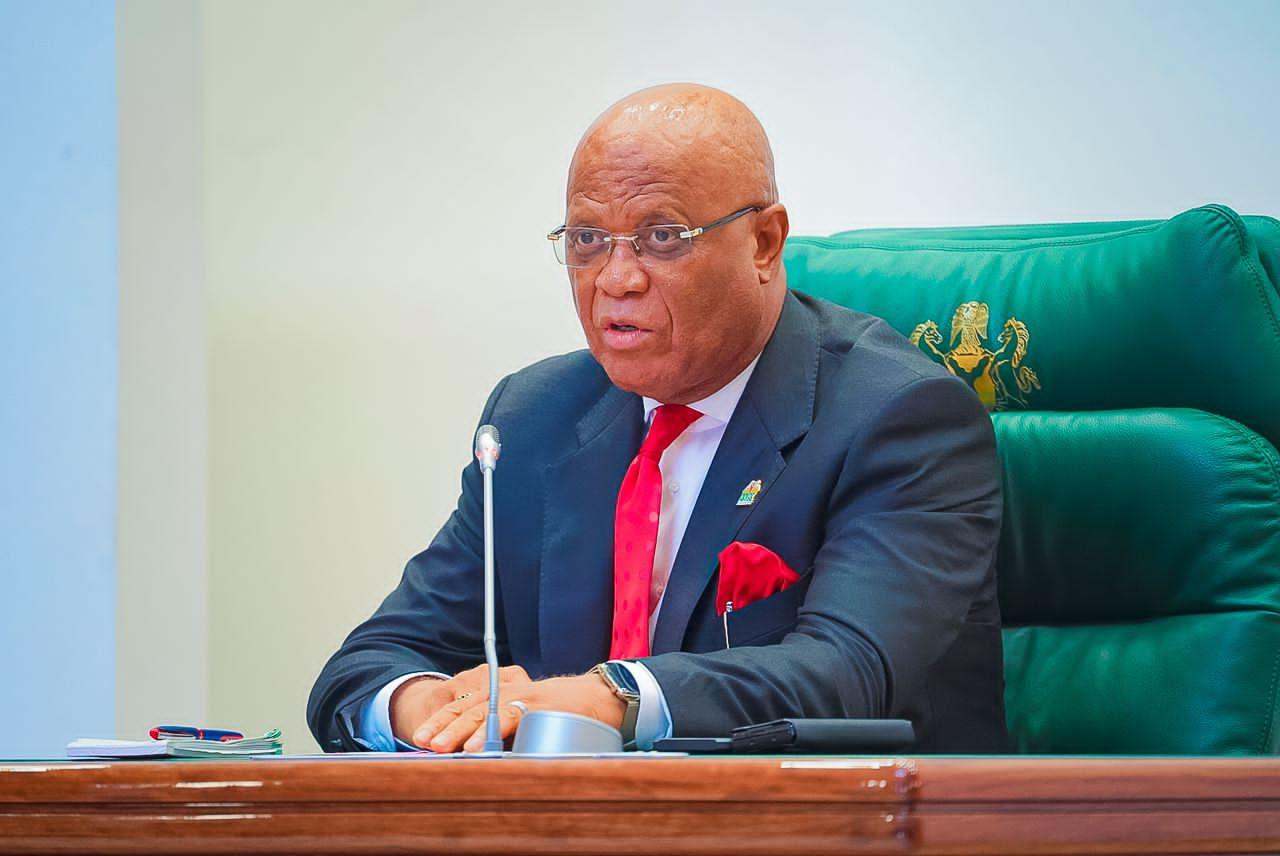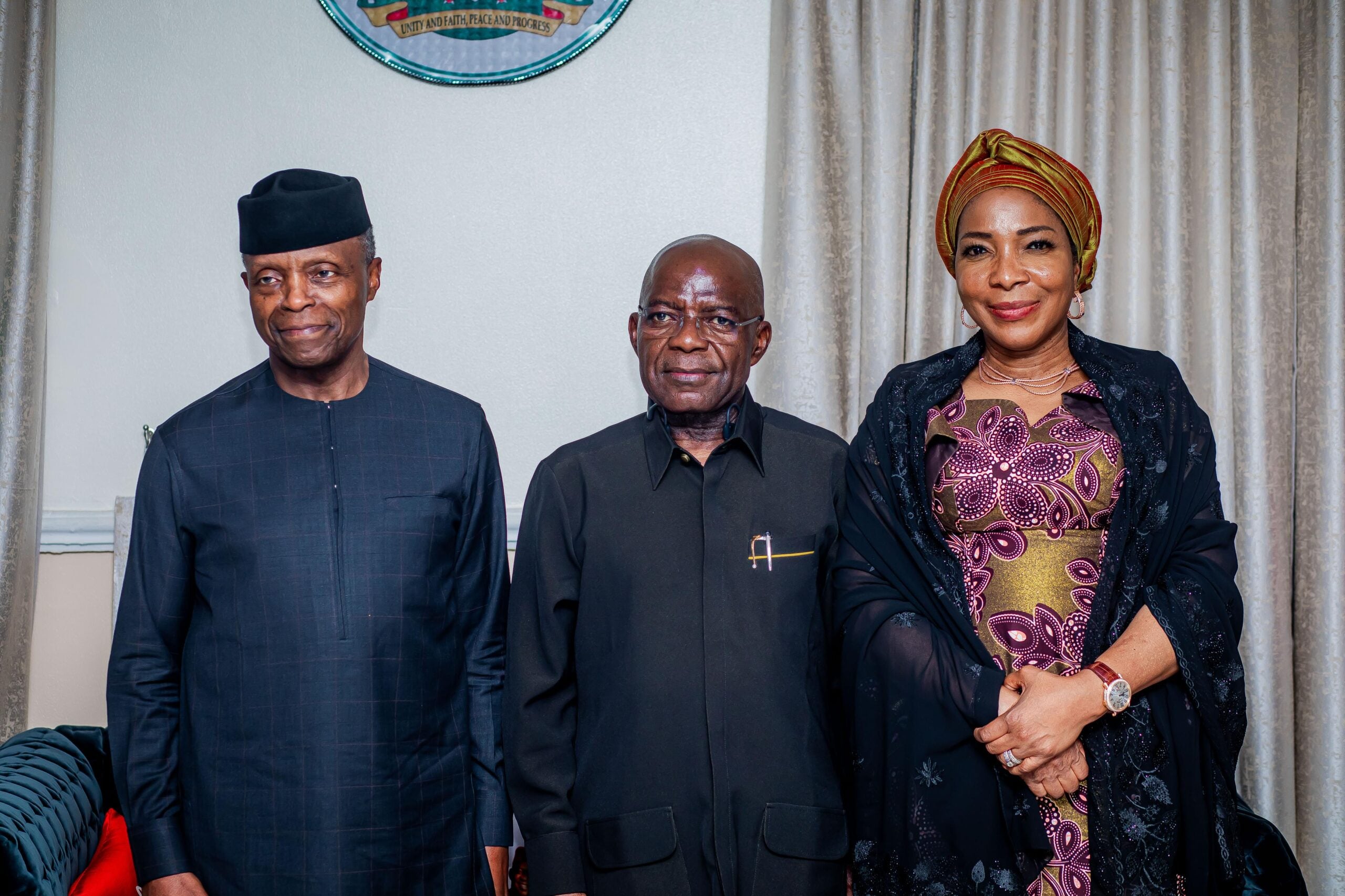Featured
Enhancing Food Security: Governor Umo Eno’s Worthy Interventions
Published
2 years agoon
By
Editor
By Michael Effiong
Today, the biggest threat to the survival of mankind is food security. Indeed, the phenomenon has taken a global dimension and is not confined to the borders of any nation.
Growing hunger has been fueled by a toxic mix of climate change, insecurity and a global economic crisis that has exacerbated poverty and inequality, affecting the ability of many families and communities to cope.
In Nigeria, at least in the last few months, there is no topic that has been more discussed than that of the rising cost of food stuff and the hunger in the land.
As US President John F. Kennedy once said, “The war against hunger is truly mankind’s war of liberation.” This is a war that must be fought with vigor and won.
On his visit to Niger State on Tuesday, March 12, 2024, President Bola Ahmed Tinubu called on states to support the federal government’s effort in the area of agriculture and food security.
Interestingly, long before this call by Mr. President, Akwa Ibom State Governor, Pastor Umo Eno has already taken action.
How? Well, you can call him the modern day Nostradamus and will not be wrong. It was not that he was clairvoyant but we can adduce it to his power of vision because agriculture was one of his focus areas even before his overwhelming victory at the polls on March 18, 2023.
The then candidate Umo Eno had developed an economic blueprint for his campaign dubbed the ARISE Agenda. A of the A-R-I-S-E stands for Agricultural Revolution.
Having had this as part of his economic blueprint, it is no wonder that the Umo Eno administration had already hit the ground running and has been laying out plans, programmes and projects that are worthy of emulation in a bid to stem the tide of the current national crisis.
Perhaps what can be described as the most impactful and innovative intervention in the area of food sufficiency and sustainability in the country at the moment was signed into law on Thursday, March 14, 2023 as the Akwa Ibom State Bulk Purchase Agency which aims at ensuring that staple foods are available, accessible and affordable to the most vulnerable in the state.
Everyone knows that implementing this kind of programme can be herculean, but the government set up a committee with a well-laid out plan to ensure this works efficiently.
This programme, like others the Governor has initiated, would be devoid of any political coloration. Already, government has met with traders and market associations. Foodstuff agents will be selected and trained. They would all sign an agreement with government and would be the ones to operate branded shops and redemption centres that will be located in selected markets and points across the 31 LGAs.
The Agency would use a voucher system akin to the Food Stamps now known as the Supplemental Nutrition Assistance Program in the United States.
The Akwa Ibom equivalent when deployed, will operate in a similar fashion because it would be strictly for vulnerable indigenes who will exchange the monthly vouchers for staple food items.
The beneficiaries would get direct subsidies as they would pay well-discounted prices to the agents for the value of the food item on each voucher. The accredited agents would later present these vouchers to government for reconciliation and reimbursement.
Furthermore, the Governor’s 368 Personal Assistants in the wards are to help implement the programme at the grassroots while names of all agents and beneficiaries ( drawn from the state social register which had recently been updated) would be published.
It is expected that from this arrangement and involvement of many stakeholders, the Agency’s mandate would be delivered within a short period of time.
Knowing full well that the Agency’s work is a short term measure, Governor Eno is also thinking long term and has started preaching the “Back-To-Farm” message. His goal is to inspire Akwa Ibomites from all walks of life to see the benefits of farming.
In his words: “Please everybody, no matter how small your land is even if it is just behind or beside your house, sow something. We must return to the farm”
Let us cast our minds back to what used to be the norm back in the day. Our parents and grandparents used to have little farms around the house where green vegetables, tomatoes, pepper, okra, maize, yams, cassava e.t.c. were grown. Some even reared chickens and goats too.

Governor Umo Eno signing an MOU with Prof. Godfrey Nzamujo of Songhai Farms Initiatives Nigeria
Many may see this as a call to subsistence farming in today’s technologically-advanced world, but in truth, if we are able to grow a few of what we eat, it will not only reduce the hunger in the land in a matter of months, but it will free up funds for people to use for other things.
This initiative by the Governor for rural and urban dwellers to go back to the farm is already being practiced by other countries to boost their food supply. It is called urban farming.
Countries such as Argentina, Australia, Canada and China are way ahead and have incorporated this into their urban planning and city regeneration projects.
A good example of the success of this initiative is the city of Rosario in Argentina. Rosario’s Urban Agriculture Programme (Programa de Agricultura Urbana, or PAU) started small, but now grows nearly 2,500 tons of food each year. What started as a means of feeding the population in the wake of an economy in tatters is now a cornerstone of the city’s food sustainability initiative. This shows that the Governor’s call is a much needed step in the right direction.
Also, the government has commenced Phase II of the AK Cares Programme. Beneficiaries across the 31 LGAs would get farm implements, seedlings, poultry birds or fish juveniles and adequate training.
The Ministry of Agriculture is also being galvanized to distribute improved seedlings and support agriculture cooperatives to help increase their productivity. And the Ibom FADAMA Microfinance Bank has been restructured in line with the present realities.
That is not all, the Governor who takes the welfare of the citizens seriously also signed the Akwa Ibom State Agricultural Loans Law (Amendment) Bill, a private member bill sponsored by Hon. Mfon Idung. The law has increased the amount to be granted as loans to individual farmers, corporate entities and cooperative societies and would enable them expand their operations, embrace modern farming techniques, boost productivity and ultimately, drive economic transformation.
It is worth mentioning also that Governor Eno’s people-centred intervention strategy also includes a rejuvenation of the rural communities through construction of rural roads and provision of key amenities. This idea is well captured in R (Rural Development) of the ARISE Agenda. The nexus between rural development and agriculture are as inseparable as a set of conjoined twins!
This school of thought concerning the importance of rural development as a way of boosting agriculture is also held by former Agriculture & Rural Development Minister and current President, African Development Bank (AfDB), Dr. Akinwunmi Adeshina.
He expressed these sentiments most succinctly while delivering his acceptance speech on his conferment with the Obafemi Awolowo Prize for Leadership in Lagos recently.
According to him “Nigeria must completely transform its rural economies to ensure food security for all. A better Africa must start with the transformation of rural economies. That is because some 70% of the population live there. Rural poverty is extremely high. At the heart of transforming rural economies is agriculture, the main source of livelihoods.
“As a young student who attended high school in the village, I witnessed the high correlation of agricultural performance with education. “It was common then to hear the phrase “Agbe lo ba” . (farmers are kings), uttered with great pride
“The transformation of rural economies must therefore be structural, systemic, strategic and comprehensive. Doing so, means agriculture must be turned into a wealth creating sector. Sound public policies transform the lives of people”.
No one can dispute the need for sound policies as enunciated by Dr. Adeshina and this is reason as an ardent advocate of agribusiness and with Sustainable Development Goal (SDG) 2 in mind, the Governor’s earliest move in the agricultural sector on assumption of office was to sign an MOU with Songhai Farms for the development of Ibom Model Farms.
This long-term partnership is aimed at driving a technologically-driven agricultural revolution that will boost food production, tourism, youth development, knowledge transfer and job creation.
While construction has already begun at the first farm located in Nsit Ubium LGA (others will spring up when LGAs make land available), the Governor has shown his seriousness for this project by sponsoring some youths on training programmes in preparation for the Farm’s take off.
With all hands already on deck and machinery put in motion to operationalize the multi-layered approach initiated by the Gov. Umo Eno-led administration, the indigenes of Akwa Ibom State are soon going to heave a sigh of relief. Not only would the issue of high cost of foodstuff be history but food sufficiency would become the new normal in the state.
.Effiong, a journalist, is Senior Special Assistant (Lagos Liaison) to Governor Umo Eno
Related
You may like
-


My Memoir: How I Survived Nigeria/South Africa Match by Eric Elezuo
-


Rotary Africa, Taiwan Sign Historic Inter-Country Committee Protocol Agreement
-


” Akwa Ibom Is Rising & The Golden Era is Here”- Governor Umo Eno reveals on New Year
-


PHOTO NEWS: Akwa Ibom Governor Feels People’s Pulse, Joins Commercial Flight
-


Abiodun Oshinibosi Introduces Girl-Child Matrix Project
-


Efik Group Cautions Deposed Obong To Respect Supreme Court, Stop Parading As King
Featured
Vote Buying, Low Turnout Mar FCT Polls – Yiaga Africa
Published
2 hours agoon
February 21, 2026By
Eric
A civil society organization, Yiaga Africa, has released its preliminary report on the 2026 Federal Capital Area Council Elections held on Saturday.
The civic group reported that vote buying was witnessed at various polling units in the election.
The Independent National Electoral Commission (INEC) conducted elections for the position of chairman in the six area councils of the FCT, as well as for 62 councillorship seats.
Yiaga Africa said it deployed trained and duly accredited roving observers to systematically monitor the conduct of the elections.
It said that its observers were deployed by 7:30am and covered polling units across the sixty-two wards of the FCT, with their mandate including observing key aspects of the voting process, including opening procedures, accreditation, voting, and counting.
Yiaga Africa said it observed that the election was conducted in a largely peaceful atmosphere, adding that voters who presented themselves at polling units were afforded the opportunity to exercise their franchise without widespread disruption but added that notwithstanding this enabling environment, voter turnout was generally low, with most polling units recording poor turnout.
It said that logistical challenges adversely affected the timely commencement of polling, particularly in the Abuja Municipal Area Council, AMAC, where delays in the deployment of personnel and materials contributed to late opening in several locations.
It added that the relocation of certain polling units coupled with inadequate and untimely communication of these changes to voters generated confusion and may have resulted in voter disenfranchisement saying that such administrative lapses have significant implications for electoral access and public
On its preliminary findings, the election watch agency said: “Yiaga Africa observers reported a delayed commencement of polling in several polling units, primarily attributable to logistical inefficiencies and, in some instances, election security–related challenges.
“As of 9:00 a.m., set-up activities were still ongoing in the majority of polling units observed, indicating that essential preparatory procedures had not been completed within the timeframe prescribed by electoral guidelines.
“In the Abuja Municipal Area Council (AMAC), particularly in Wuse and Gwarinpa wards, several polling units opened significantly behind schedule. Observers noted that polling officials were still arranging materials and organizing the voting environment as at 9:00 a.m., with accreditation and voting commencing only after 10:00 a.m. On average, across the sampled polling units observed, accreditation and voting began at approximately 10:00 a.m.
“Consistent with the Commission’s guidelines, critical election materials including the Bimodal Voter Accreditation System (BVAS) devices and the voter register—were deployed in the polling units observed.
“However, in Polling Unit 004, Wuse Ward, Zone 2 Primary School, the voter register was not initially available and was only produced after observers raised concerns and voters objected. In addition, essential voting materials were absent in certain locations. Voting cubicles were not observed in PU002 (Ward 09), PU006 (Ward 01), and PU012 (Ward 10) in Abaji Area Council. Furthermore, an ink pad required for the voting process was reportedly missing in one polling unit observed.
“Observers reported instances in which voters were reassigned to newly created polling units without prior or adequate notification. While Yiaga Africa acknowledges INEC’s efforts to notify affected voters via SMS, many of these messages were delivered on Election Day, with some received hours after polling had already commenced. The lack of timely and effective communication generated confusion at several polling locations, as numerous voters spent over an hour attempting to ascertain their designated polling units.
“In multiple instances, this administrative shortcoming contributed to congestion and
overcrowding, thereby undermining orderly queue management and potentially
discouraging voter participation.
“The observation further revealed significant disparities in voter distribution within the same polling locations. Such pronounced imbalances raise serious concerns regarding the coherence, and reliability of the Commission’s polling unit expansion and voter redistribution framework.
“Closing of Polling Unit before the official 2:30pm: Observers reported some polling
units closing the polling process before the official 2:30pm close time. While some
polling units experienced poor voter participation, the guideline requires the polling unit to remain open until 2:30pm or the last person on the queue votes.
“Security Deployment and Observer Access: Yiaga Africa observed heavy security deployment in certain locations, which, in some instances, impeded the movement of accredited election observers and restricted access to polling units. Observers further noted that the heightened security presence created barriers for citizens attempting to
access polling units to exercise their right to vote.
“Vote buying: The persistent menace of vote buying once again manifested during the election. Yiaga Africa observers documented incidents of vote buying at polling units, underscoring the continued vulnerability of the electoral process to monetary inducement.
“Despite prior assurances and directives issued by INEC to security agencies to identify and apprehend both vote buyers and sellers, these illicit practices reportedly continued in several locations.”
DailyPost
Related
Featured
I’m Proud of You, Osinbajo Tells Abia Gov Alex Otti
Published
2 days agoon
February 19, 2026By
Eric
Former Vice President Yemi Osinbajo has applauded Governor Alex Otti of Abia State for what he described as purposeful, people-centered leadership that is repositioning Abia State for sustainable growth and prosperity.
Speaking during his visit to the governor in his office on Wednesday, February 18, which coincided with Otti’s birthday, Osinbajo expressed deep appreciation for the governor’s hospitality and outstanding performance in office, noting that the true essence of public service is making meaningful differences on the lives of the people.
“I am extremely proud of the work you have done so far, you have lived up to expectations – not only to the people but also to your friends and associates. In the short time I have been here, I have seen tangible evidence of progress.” The former Vice President stated.
Prof. Osinbajo particularly commended Governor Otti’s bold social welfare reforms, including assenting into law, the Senior Citizens’ Law.
He described the initiatives as exemplary and deeply rooted in compassion and social responsibility, emphasising that the world’s most successful welfare systems are built on care for the vulnerable.
He also lauded the extensive road infrastructure renewal and improved connectivity across the State, describing the projects as visible symbols of purposeful and results-driven leadership. While reflecting on the demands of leadership, Prof. Osinbajo noted that while many aspire for public office, true distinction lies in delivery.
“Sometimes you wonder whether, after all the efforts to get into office, leaders are able to fulfill their promises. But in your case, you have done not just what you promised, but even more. You have made public service worthwhile,” Prof. Osinbajo added.
He prayed for renewed strength, wisdom, and divine favour for Governor Otti as he continues the work of transformation in Abia State.
In his response, Otti warmly welcomed Osinbajo, describing him as a brother, friend, and mentor, whose visit was deeply appreciated.
The governor clarified that the gathering was not a planned birthday celebration but just marking the day, noting that he rarely celebrate such occasions publicly, especially while serving in public office.
He expressed gratitude to well-wishers who came voluntarily and emphasised his preference for modesty and focus on service.
Otti thanked God for the progress recorded within 32 months in office, describing the administration’s achievements as modest but impactful.
He reiterated that governance must remain centered on the welfare and security of the people.
“Governance is about the people their welfare, their safety, and their peace of mind. If you enter office for any other reason, you miss the essence of leadership,” Governor Otti stated.
He recalled decisive actions taken in the administration’s first month, when some local governments were under the control of non-state actors. The governor said that firm intervention restored order and ensured that communities once inaccessible are now safe and open to residents.
Governor Otti also commended security agencies for their round-the-clock dedication, acknowledging their sacrifices in maintaining peace and stability across the state.
“We are grateful to the men and women who stay awake so that our people can sleep in peace,” Otti stated.
Earlier, the Secretary to the State Government, Dr. Emmanuel Meribole, on behalf of the State Executive Council, extended warm birthday wishes to the governor, praying for continued strength and fruitful years ahead.
Related
Featured
Gunmen Invade Ondo Palace, Kill Monarch in Failed Abduction Attempt
Published
2 days agoon
February 19, 2026By
Eric
Suspected armed bandits have killed a traditional ruler, Oba Kehinde Falodun, the Alagamo of Agamo community, during a violent assault on his palace in Akure North Local Government Area of Ondo State.
The attackers, reportedly about 10 in number, were said to have stormed the monarch’s residence on Wednesday evening in what residents described as an attempted abduction of the royal father and members of his household.
According to the Olori (Queen), who narrowly escaped, the gunmen initially attempted to whisk the monarch away but encountered resistance before the situation escalated.
“The bandits just came and started shooting. They were about 10. Three stayed at the entrance while others came inside. I ran into the bush. They shot at me, but it did not affect me,” she said.
She added that when the kidnappers failed to subdue the monarch, they resorted to violence.
“They kept dragging my husband, and I kept shouting for help. Later, they hit something on his head and stomach. He has been killed,” she said.
Confirming the incident on Thursday, spokesman for the Nigeria Police Force in Ondo State, DSP Abayomi Jimoh, said the command received distress information around 7:50 pm from a community leader.
He said about six armed men invaded the palace, forcefully took the monarch from his compound, and fled.
“The victim was later found a few metres away with gunshot wounds. He was confirmed dead at the scene,” Jimoh stated.
He disclosed that the Divisional Police Officer, alongside tactical teams, immediately mobilised officers and local security groups, including Amotekun Corps, hunters, and Atuluse vigilantes, to comb nearby bushes in search of the attackers.
According to him, surveillance has been intensified across the area while efforts continue to track and apprehend the suspects.
“The Command assures residents that no stone will be left unturned in bringing those responsible to justice,” he added.
Meanwhile, elders and traditional chiefs in Agamo have condemned the killing, describing the late monarch as a peace-loving leader who played a major role in resolving disputes and promoting development in the community.
A community leader, who asked not to be named, said the attack has created fear and a leadership vacuum.
“This is a painful loss to us. Kabiyesi was very close to the people. We appeal to government and security agencies to act fast and ensure those behind this are arrested,” he said.
The incident adds to growing security concerns in the state, where kidnappings, attacks on farmers, and assaults on rural communities have increased in recent months.
Related



Adding Value: Confidence and Succces by Henry Ukazu

Vexatious and Meddlesome: ADC Condemns Wike’s Tour of FCT Polling Units

Vote Buying, Low Turnout Mar FCT Polls – Yiaga Africa

The Power of Strategy in the 21st Century: Unlocking Extraordinary Possibilities (Pt. 2)

The Oracle: Entertainment, the Next Hope for Nigeria After Oil (Pt. 1)

Friday Sermon: Reflections on Ramadan 1: Prophet’s (SAW) Ramadan Sermon

I’m Proud of You, Osinbajo Tells Abia Gov Alex Otti

WAEC Releases 2025 CB-WASSCE for Private Candidates, Withholds 1899 Results

Alleged N432bn Fraud: El-Rufai Spends Monday Night in EFCC Custody

Loyalty to APC Reason I’ll Oppose Gov Alex Otti in 2027 – Orji Kalu

Ogbunechendo, Ooni Differ on Southern Traditional Rulers’ Council

FG Files Charges Against El-Rufai over NSA Phone-tapping Claims

Senate Passes Electoral Act Amendment Bill 2026

INEC Promises e-transmission of FCT Council Poll Results, Warns Against Vote-buying
Trending
-

 News5 days ago
News5 days agoWAEC Releases 2025 CB-WASSCE for Private Candidates, Withholds 1899 Results
-

 Headline5 days ago
Headline5 days agoAlleged N432bn Fraud: El-Rufai Spends Monday Night in EFCC Custody
-

 Featured4 days ago
Featured4 days agoLoyalty to APC Reason I’ll Oppose Gov Alex Otti in 2027 – Orji Kalu
-

 Featured4 days ago
Featured4 days agoOgbunechendo, Ooni Differ on Southern Traditional Rulers’ Council
-

 Headline5 days ago
Headline5 days agoFG Files Charges Against El-Rufai over NSA Phone-tapping Claims
-

 National4 days ago
National4 days agoSenate Passes Electoral Act Amendment Bill 2026
-

 Featured3 days ago
Featured3 days agoINEC Promises e-transmission of FCT Council Poll Results, Warns Against Vote-buying
-

 News3 days ago
News3 days agoDSS Arrests El-Rufai After Release from EFCC Custody

